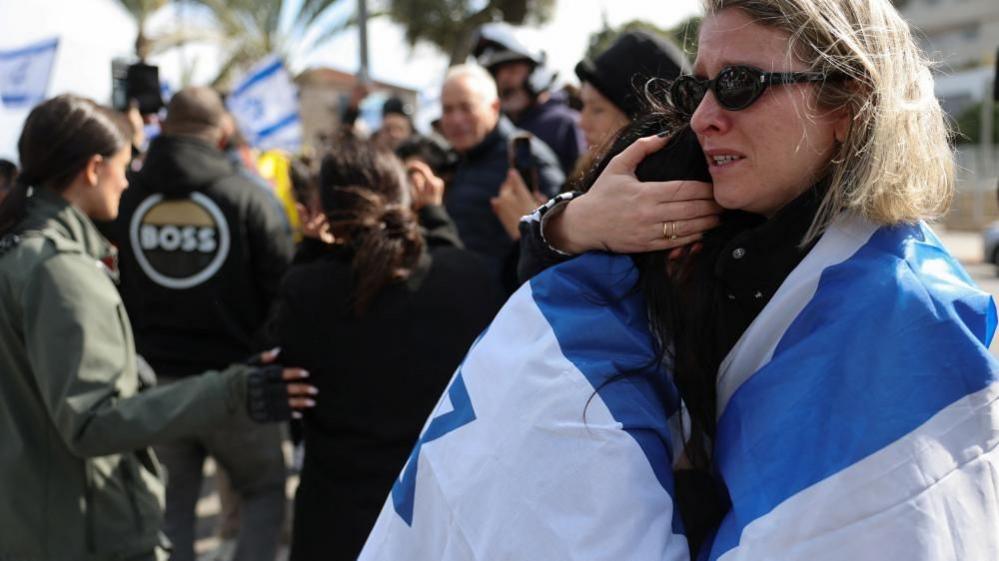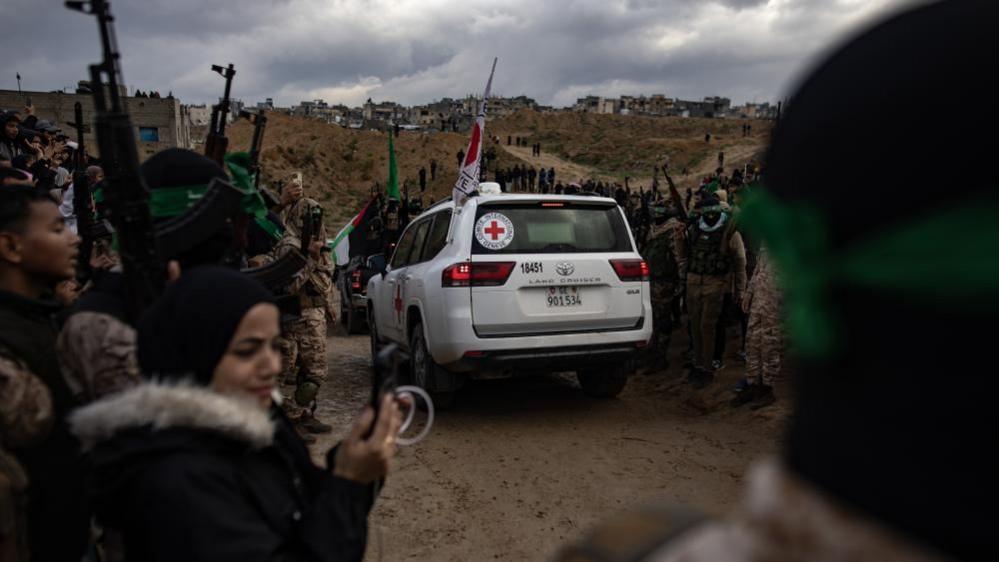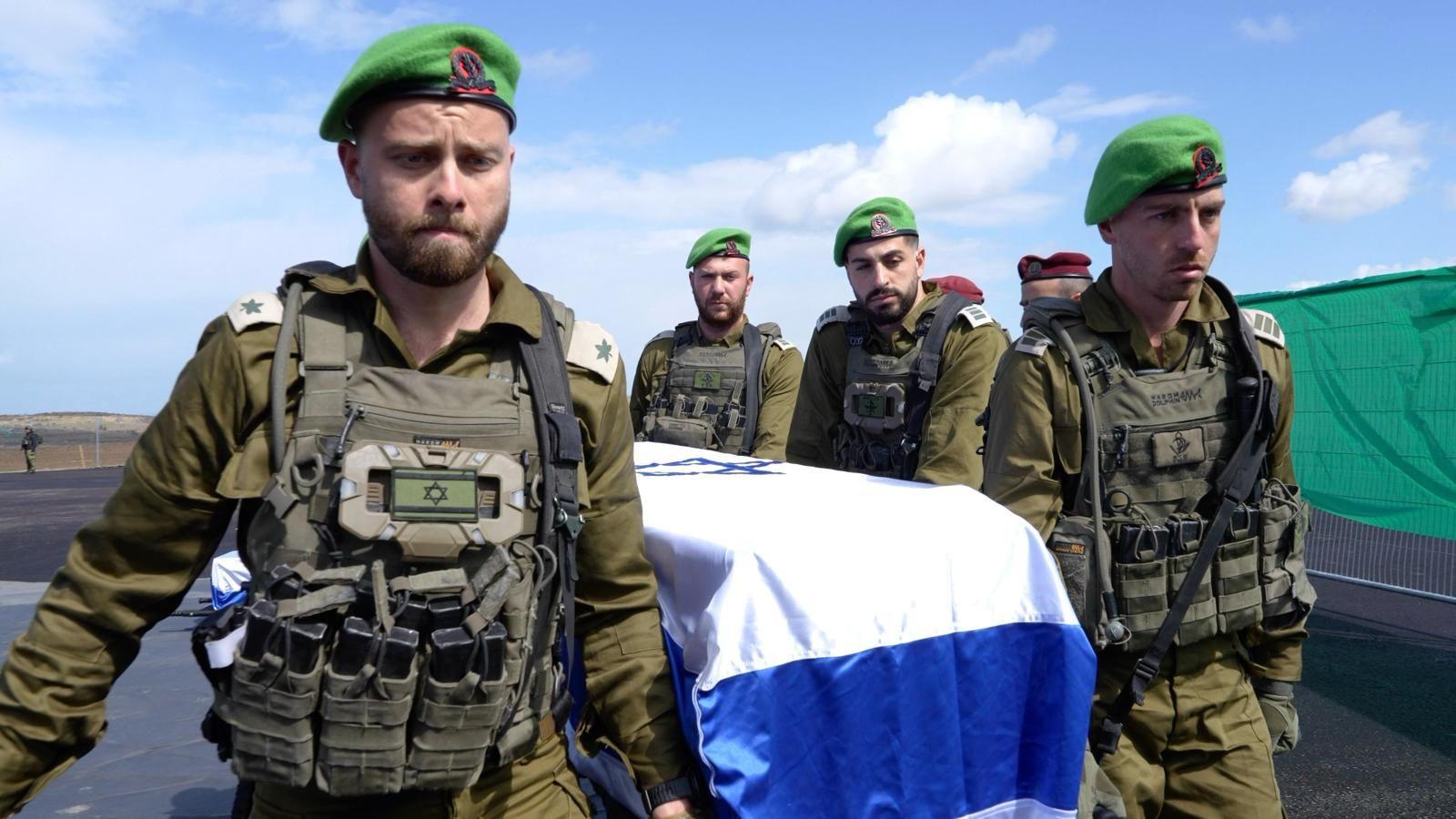Return of bodies marks day of anguish for Israel

Israelis gathered at Hostages Square in Tel Aviv mourned the return of the bodies
- Published
On a bleak late winter's day, under leaden skies and occasional driving rain, this was the moment all Israelis had been dreading.
The return of the dead.
It began, as all the handovers so far have begun, with a politically charged display by Hamas and other Palestinian armed groups involved in holding Israeli hostages for over 500 days.
Once again, there was a stage, flanked by huge posters highlighting the catastrophic consequences of Israel's military campaign in Gaza and the Palestinian determination to stay put.
But instead of haunted, sometimes emaciated, survivors, there were four black coffins, each bearing a photograph and a name – Oded Lifschitz, Shiri Bibas and her two young sons, Ariel and Kfir - accompanied by the image of Israel's Prime Minister, Benjamin Netanyahu.
Missile casings bore the slogan: "They were killed by US bombs". Hamas has long argued that all four were killed by Israeli air raids on Gaza, something which has not been verified.
As previously, Red Cross officials were on hand to oversee the process. In a rare public statement on the matter, they had urged Hamas to conduct the handover in a private, dignified fashion.
Their efforts had clearly been in vain, but they attempted to screen the coffins from public scrutiny, draping each one in a white sheet before driving them away.
The watching crowd was smaller than usual, perhaps because of the heavy rain.
After Thursday morning's handover, at a military ceremony on the edge of the Gaza Strip, the coffins carrying the hostages were draped with Israeli flags and prayers offered by the army's chief rabbi.
A convoy of vehicles then made its way north towards the Abu Kabir forensic institute, in Jaffa, where formal identification of the bodies is taking place.
Along the route, small groups of Israelis stood silently in the rain, carrying Israeli flags and yellow banners - the colour associated with the hostages and their supporters.
In Karmei Gat, where displaced members of kibbutz Nir Oz are living, waiting to go home, the vigil was particularly sombre.
All four of Thursday's released hostages were seized from Nir Oz on 7 October 2023.
Tel Aviv's Hostages Square was a study in grief, with people crying or sitting on the ground, heads in hands.
The faces of the red-headed Bibas boys - Ariel and Kfir - are plastered on walls, road signs and in windows up and down the country. Fearing the worst, Israelis have nevertheless clung to the hope that the brothers might have survived, along with their mother, Shiri.
"We were devastated by the news," Orly Marron said, outside Abu Kabir.
"I have red-headed grandchildren and seeing the photographs is really very heartbreaking."
Oded Lifschitz's son, Yizhar, meanwhile told Israel Radio that he had always feared for his father's health, since his violent abduction in October 2023.
Oded was 84 years old at the time. He and his wife, Yocheved, were both taken to Khan Younis in Gaza, where they were separated, never to see each other again.
Yocheved was released by Hamas two weeks after the attack.
"We need to close this wound and move forward," Yizhar said, adding that his father, a noted journalist and peace activist, had long had a vision about how to resolve the conflicts of the Middle East.
"It's sad that we went through this whole cycle and didn't solve it," Yizhar said. "We left it as something simmering, and look where we are now."

Some Gaza expressed bitterness that bodies of Israelis had been released
Meanwhile, back in Gaza, some Palestinians expressed their anger that Israeli bodies had been handed over, while an unknown number of Palestinians killed in Israel's military campaign remain buried in the apocalyptic wreckage of the Gaza Strip.
In addition, as many as 665 bodies are being held by Israel in numbered cemeteries, according to a Palestinian protest group, The National Campaign to Recover the Bodies of the Martyrs. It says some have been held for decades.
"I don't like this agreement at all," Ikram Abu Salout said in Khan Younis. "They didn't remove the rubble and we don't even know where our children and families are."
As she was speaking, bulldozers flying Egyptian flags were finally arriving in northern Gaza. Israel allowed the equipment to enter, in exchange for Thursday's handover and the release of six more living hostages this coming Saturday.
- Published20 February
